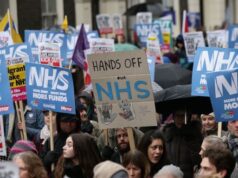Issue: 20
December 2014
This occasional newsletter is researched, written and edited by a group of concerned residents in Ealing, West London who want to preserve our NHS. We view the wholesale engagement of private, for-profit healthcare service suppliers as unnecessary, profligate and dangerous. Process improvement is what is needed in our NHS – not revolution.
NHS Funds 23 NHS NW London Staff, GPs and ‘Patient Representatives’ to Visit USA for a Week at a Cost of £120,000
Mystery still surrounds this trip which began on Saturday 29 November 2014. The trip itinerary apparently takes them to Boston, New York, Baltimore and Richmond. Details leaked out a few days before and were reported in the ‘London Evening Standard’. Save our Hospitals Hammersmith complained bitterly about the trip and Imperial NHS Health Trust boss Dr Tracey Batten pulled out of the trip at the last minute. We haven’t discovered who from Ealing is on the trip, but ‘Shaping a Healthier Future’ supremo Dr Mark Spencer is thought to be participating.
The organisers of the trip are management consultants, McKinsey & Company. McKinsey has earned many millions of fees from NHS NW London and is well known to favour marketised, insurance based healthcare. Ex-McKinsey consultants occupy a number of senior positions in the NHS.
+ In view of the well publicised crisis in A&E in NW London right now the timing of this covert junket is appalling.
+ A number of us attend public Ealing Clinical Commissioning Group (ECCG) meetings. The existence of this trip has never been mentioned in these meetings. Why was this?
+ Healthwatch Ealing is supposed to represent NHS patient interests. Why didn’t Healthwatch Ealing publicise this trip? Is Healthwatch Ealing participating in the trip?
Reflecting on the Local NHS Crisis
It does seem quite extraordinary that the Coalition Government and NHS top management can continue saying ‘..A&E units will remain open long term at both Charing Cross and Ealing Hospitals’. Over the last two years I have come to appreciate that when intensive care beds, consultants and services are removed, then A&E services can no longer be provided. We all know that the removal of intensive care at Ealing Hospital is planned for sometime after March 2015, so why can’t the bosses and politicians just be honest about what is inevitably going to happen? It’s common knowledge that it is planned to demolish Ealing Hospital. Most of the land will be re-used for residential development. On a small part of the land a large GP surgery will be built. This new facility will operate as an Urgent Care Centre.
On 11 November 2014 I drove past Ealing Hospital and 12 ambulances were queuing on the road and ramp services at the A&E entrance. I have never seen so many ambulances there before. One has to surmise that most of them were carrying patients queuing for A&E. Backing this up is an NHS report which placed London North West Hospital Trust (which includes Ealing Hospital) as one of the four worst performing Trusts in England for week ending 19 October 2014. Overall the Trust failed to see 32.32% of A&E patients within four hours. For the week ending 9 November 2014 only 69.2% of Type-1 A&E patients (the most seriously ill) were dealt with in 4 hours.
A&E waiting times have also rocketed at West Middlesex Hospital since the closure of Central Middlesex and Hammersmith Hospital A&Es in September 2014.
Colin Standfield of Save our Hospitals (saveourhospitals.blogspot) made the point recently that we were all promised Community and Primary Care enhancements to take 80% of the A&E load that didn’t need to be in hospital. But, he asks, where are these enhancements? In reality they still do not exist.
On 16 November 2014 Colin Standfield wrote to all our local MPs emphasising that there is no substantial extra A&E demand locally. There is though a crisis in local A&E services caused by the elimination in September 2014 of Central Middlesex and Hammersmith Hospital A&E units. As well as the increase in pain and possible mortality caused by longer A&E waiting times, there are other disturbing knock-on effects. These include early discharge problems, record rates of day case cancellations and the shuttling of patients around north west London to find admission beds.
The ‘Daily Mail Online’ reported on 22 November 2014 that NHS NW London had launched an inquiry about poor A&E performance at Northwick Park and Ealing Hospitals. This inquiry, amongst other things, will look at death rates at both hospitals. The article strongly suggests that re-organisation supremo Dr Mark Spencer wants to blame our local A&E chaos on poor A&E performance at Northwick Park and Ealing Hospitals, rather than attributing it to the closure of A&Es at Central Middlesex and Hammersmith Hospitals
As for ‘changing settings of care’ it’s clear that what is being pushed is for greater use of pharmacists, paramedics in ambulances and more treatment in existing and new local GP staffed facilities, and at home. For me the acid test will be how this works for the millions of mentally ill patients throughout England.
‘Your Healthcare in Ealing’
On 27 November 2014 a 20 page NHS booklet called ‘Your Healthcare Services in Ealing’ arrived in my letter-box at home. It aim is clearly to tell Ealing residents about local healthcare services. It also gives some information on future local healthcare facilities. On the face of it, the booklet is quite useful.
The booklet’s tragic flaw however is that its content is totally devoted to physical healthcare services. The term ‘mental health’ is not even mentioned once. There are no details on primary or secondary mental health services. There are no details of mental health facilities. One in five Ealing adults are suffering from mental health problems at any one time. Expenditure on mental health services is the single highest item of healthcare service expenditure in Ealing. This absence of mental health service information is disgraceful and totally irresponsible.
In the ‘Improving hospitals’ section it says that there are ‘plans for a redeveloped local hospital with A&E’ at Ealing Hospital. I just don’t believe this. We all know that most of Ealing Hospital will be demolished and that a ‘traditional’ A&E with intensive care consultants and beds will not be retained on the site. It is simply impossible to describe what is planned for the Ealing Hospital (demolishing a major hospital) under a heading ‘Improving hospitals’.
In ‘Improving GP services in Ealing’ we are told that at least 3 GP practices are open every weekend spread across the borough. This is all well and good, but where is the web site address, email address or phone number we can all access to find out which GP surgeries are open on any one weekend?
Closure Date Decision on Ealing Hospital Maternity Unit Delayed at Last Minute
The Ealing Clinical Commissioning Group (ECCG) had planned to discuss(?) and decide/confirm the date for the closure of the Ealing Hospital Maternity Unit at a meeting on 26 November 2014. However on 18 November 2014 we learnt that that meeting had been postponed till January 2015. Later in November this postponement was described by the ECCG as till the New Year. Reasons given for this delay were issues related to Paediatric training. A hospital clinician I spoke to found these reasons not very credible.
Could it be that someone has done the sensible thing and has researched spare maternity capacity accessible to Ealing mothers? If they have, they may have discovered that there is no spare capacity. NHS NW London may be loath to repeat the current chaos being caused by closing two local hospital A&E units in September 2014.
Solace Mental Health Centre to Close
London Borough of Ealing’s (LBE’s) cuts for 2015/16 sadly include the closure of the Solace mental health walk-in centre in Bowmans Close W5. The centre is jointly funded by LBE and the West London Mental Health Trust (WLMHT). It’s unfortunate that WLMHT can’t step in and pay the LBE grant to keep Solace open.
Surely reducing the number of local, mental health facilities is not the way forward? Some 80 patients use the centre – some of them for over 10 years.
However it seems as if mental health service users who use the centre will be offered personal budgets which allegedly will result in £187,000 savings. My experience of mental health service users being able to assemble and manage a ‘personal budget’ is that this is often unsuccessful. LBE says that all eligible users will be able to spend their personal budgets ‘…to buy alternative services in the voluntary sector’. This might prove problematic, as I’m not aware that these alternative services actually exist.
WLMHT Mental Health Lammas Centre Recovery House Project is Scrapped
In July 2014 WLHMT boss Steve Shrubb waxed lyrical about the repurposing of the NHS Lammas Centre in Mattock Lane W5 into a 12 bedded mental health Recovery House. Local Councillors told me on 29 November 2014 that WLMHT had now cancelled this project.
2,100 Mental Health Beds Closed in England Since April 2011
An investigation by ‘Community Care’ magazine and the BBC has revealed mental health bed shortages linked to seven suicides and one homicide in England since 2012. 2,100 mental health beds have been lost since 2011. 468 mental health beds were closed during last year.
Jeremy Hunt and NHS England were warned by a senior Coroner in December 2013 about the dangers of mental health beds not being available in preventing future deaths. Hunt replied that ‘acute beds must always be available for people who need them’. However this investigation reveals that this is just not the case.
The recommended average monthly mental health bed occupancy level is 85%. However this occupancy level has stood at 101% for the past two years. Some Mental Health Trusts have occupancy rates of 120%+ for months.
The investigation has also revealed that a Chief Executive of a major Mental Health Trust wrote to NHS England during the summer informing them that there were no mental health beds available in London in either the NHS or the private sector.
Is Online Healthcare Now the NHS ‘Holy Grail’?
A November 2014 report by the National Information Board (NIB) offers the promise of more ‘digital support’ for patients. NIB claims that in future viewing test results and booking appointments online will make healthcare as simple as online banking.
Part of this nirvana is that by the end of 2015 everyone will have online access to their GP records. After a 47 year career in IT, I just don’t believe this will happen. Even more grandiose is the aspiration that emergency, urgent and primary care patients will be digitally monitored in real time by 2018 and all patients by 2020.
A big plug is given to University Hospitals of Leicester NHS Trusts whose nurses have been given iPads and iPhones to record and share patients’ vital signs. This has seemingly lifted staff morale, cut down on paperwork and allowed nurses more bedside time.
Mental health apps will also become available including one offering Cognitive Behavioural Therapy (CBT). It is, however, hard to imagine that CBT could be successfully delivered without considerable expert human counselling.
By 2020 there will be over six million people in the UK of 75 years old or older. I wouldn’t have thought many of these folks will be willing or able to use these new online healthcare initiatives.
Agency Nurses Now Cost NHS £5.5 Billion a Year
On 2 November 2014 ‘The Observer’ reported this figure and added that the cost had risen each year over the last four years. In 2009 the annual agency nurses’ salary bill was £734 million. Agency nurses are now costing the NHS up to £1,800 per head per day.
I suppose this is a predictable development when many hospitals are under threat of closure and constant change seems to be the order of the day.
Better Care Fund (BCF) Appears on Brink of Collapse. Hillingdon Just Refuses to Entertain BCF
In November 2014 ‘The Guardian Online’ reviewed the National Audit Office’s (NAO’s) unflattering review of the Government’s Better Care Fund (BCF) initiative. BCF, announced in autumn 2013, aims to integrate NHS healthcare services with Local Authority social care services. The plan is for BCF to go live in April 2015.
The BCF business case is about saving money and reducing admissions to hospitals. The NAO is clearly unconvinced that the latest savings estimate of £523 million is a credible one. NAO states that the BCF plans contain ‘bold assumptions’ about savings next year. It views planned reductions in emergency admissions to be based ‘on optimism rather than evidence’.
The NAO blames the Department of Health, the Department of Communities and Local Government and the Treasury for:
+ failure to agree financial and service objectives
+ failure to put in management resources, time and contingency planning appropriate for the scale of the project
+ failure to set out who was responsible for what
+ failure to look at the evidence of what works.
The London Borough of Hillingdon is so unimpressed with the BCF that it has refused to implement it.




